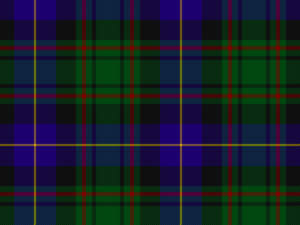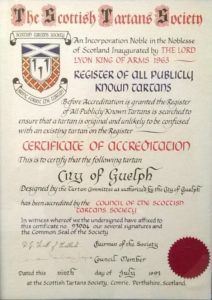On this page
Origins of the Guelph Tartan
When David Newlands suggested to Guelph City Council that a tartan be created for the City, he visualized a District Tartan; one that persons living in this community could identify with, would find pleasing and would wear with pride and satisfaction. City Council asked the newly established Tartan Committee (members included J. Archibald McIntyre, Don Peacock, Charles Hunter, C. Steward Halliday, David Newlands, and Cynthia Rantoul-Leach) to “Design a tartan which would have historical significance to the City of Guelph and which would be saleable to the public in a wide range of uses.”
The Tartan Committee’s petition for accreditation of the Guelph Tartan by the Scottish Tartans Society was submitted before the executive of the Council of the Society at a meeting held on July 9, 1993.
Having checked the tartan against the Register of All Publicly Known Tartans and having found it to be original and unlikely to be confused with another tartan, the Society confirmed that the Committee’s petition had been successful and a Certificate of Accreditation was granted. A woven sample of the tartan was received by the Scottish Register of Tartans for permanent preservation in the National Records of Scotland.
The result – the Guelph Tartan – which can be considered harmonious and attractive, commemorates the “Royal City’s” origin, and honours one of Guelph’s famous sons, whose World War I poem is preserved in the world’s consciousness.
The design
Gold, Royal Blue, Black, Reseda Green and Crimson were the colours selected for the tartan. These colours were derived from those used in the Official Coat of Arms for the City of Guelph, which was originally adopted in 1879 with the proclamation of Guelph becoming a City.

Colonel John McCrae, M.D. the composer of “In Flanders Fields”, made an enduring contribution which is commemorated in the McCrae House in Guelph. The Tartan Committee drew inspiration from the MacRae Hunting Tartan, of ancient lineage, evolving differing thread counts to give effect to our specific emphasis in the use of our choice of colours.

